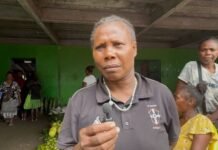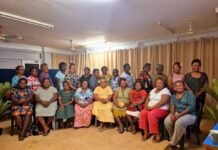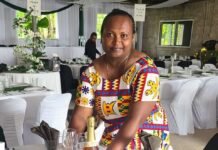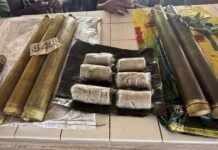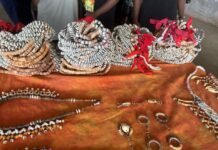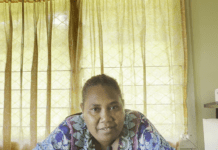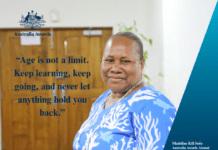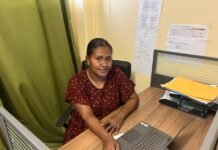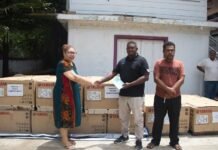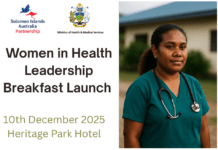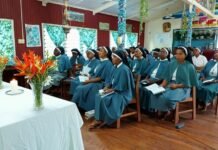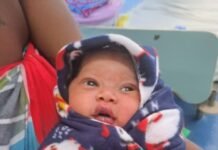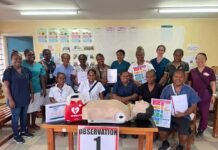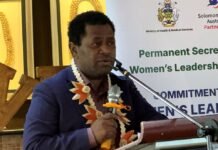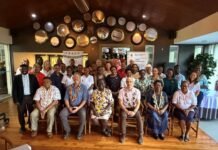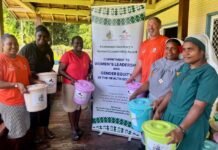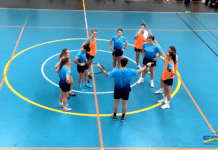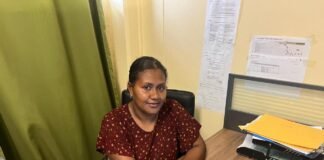
BY MIKE TUA
CERVICAL cancer is a serious disease that can be contracted by women and girls throughout the world. In Solomon Islands, it’s the biggest cancer killer of women after breast cancer and many women die from it.
It is caused by Human Papillomavirus (HPV); HPV is common and it can be spread through sexual activity and skin to skin contact. In an exclusive interview with Solomon Women, the Director of Reproductive and Child of the Health Ministry of Health and Medical Services (MHMS), Dr. Divinald Ogaoga, he confirmed that the ministry and its relevant development partners are currently planning to embark on an intensive fight to prevent the contraction cervical cancer among young children with the introduction of a cervical cancer vaccination program in the country.
Millions of women are diagnosed with cervical cancer, annually around the world, which resulted in half of them died due to the disease and it’s important that the primary prevention of cervical cancer must begin with the vaccination of young girls before they become sexually active.
Solomon Women Newspaper (SWN): What is the Background of the Cervical Cancer vaccination program?
Dr. Divinald Ogaoga (Dr. DO): From established evident reports obtain from other countries within the Pacific region, it revealed that cervical cancer is one of the leading causes of cancer in women apart from breast cancer. Therefore, based on successful vaccination programs introduced in those regional countries; Solomon Islands decided to introduce the Human Papillomavirus (HPV) vaccine into the country. Based on those evidences, it’s important that we introduce the program in order to reduce the severe impacts and longer term effects it poses for women in the country.
SWN: Who will the vaccination program mainly target?
Dr. DO: The vaccination program will mainly target girls from aged nine to 13 especially children at primary schools and out of schools. Therefore, the vaccine will help to prevent young girls from getting HPV infections and cervical cancer or genital warts later in life since it’s more effective in the fight against cervical cancer before a female became sexually active. So for the vaccine to be most effective, it is best to give it when girls are young, before they can start a family because younger girls tend to develop stronger immunity (protection) to HPV than older girls.
SWN: Where in Solomon Islands will the program be implemented?
Dr. DO: The program will be initially introduced in primary schools in Honiara and Isabel province. Once we complete and satisfy with the vaccination program in both locations, we hope that within the next two years to expand the program to other existing provinces in the country.
SWN: Why targeting only Isabel Province and Honiara?
Dr. DO: The basic reason to select Honiara is because we are here and we want to monitor its progress every day; however in Isabel province is because we want a distant province and of course, Isabel has shown a lot of great interest and willingness to initially participate in the cervical cancer vaccination program. Therefore due to the demonstration work (project) carried out in the two specific locations, we want to learn from this demonstration project before we can embark or pick other provinces in the country.
SWN: When will the vaccination program launch in the country?
Dr. DO: At the moment, the arrival of those vaccines are still not yet announced but it’s most likely the vaccines might arrive in the country by the end of this month (April). But while we are waiting for those vaccines to arrive in the country; we are currently doing preliminary work towards the launching of the vaccination program.
SWN: Who will fund the vaccination program?
Dr. DO: The vaccines will be manly funded by GAVI and other smaller development partner organizations will help with the operations of the cervical cancer vaccination program in order to operationalize the program. Other major development partners’ keen to assistance with the introduction of the vaccine in the country includes WHO, UNICEF and Australian Cervical Cancer Foundation (ACCF). Coming down to the vaccination program at the moment, the global community would like to start with the demonstration project which means a smaller project that we can learn from and then expand from there.
SWN: What sort of preliminary work has been carried out so far?
Dr. DO: Preliminary works implemented in Honiara and Isabel province includes, registrations of children and students, informing their parents, informing schools (awareness), and having discussions with groups that might have concern about the vaccines (people who don’t really understand anything crucial about the vaccines because they need to know more about that). Because by the time the vaccines arrive in the country, all of us should be aware of it at the same level, so that we have the same understanding and willing to participate for our girls to have them vaccinated. Based on clinical vaccination trials, the vaccine has proved evident to reduce a lot of cervical cancers in the world and I see no reason why we should not block the introduction of HPV Vaccination program in Solomon Islands.
SWN: How high is the number of significant cervical cancer cases in Solomon Islands?
Dr. DO: It’s actually quite high with regards to the number of cervical cancer cases in the country; but at the moment I don’t have the actual figures at the tip of my mind however it’s among one of the common cancerous diseases apart from breast cancer in the country. It’s very evident today that we have relatives, mothers and sisters whom have possessed cervical cancers but at the moment we don’t have the actual data to accurately identify the actual number of cervical cancer incidences because we don’t have the report.
SWN: What is the key message about cervical cancer vaccination program in the country?
Dr. DO: It’s very important for people especially parents to understand that if they have some difficult issues in some of the key areas that maybe need further clarification or assistance regarding the program please don’t hesitate to come to us at the Ministry of Health. It’s rather important because maybe people might have clearly understand or missed crucial information about the program so we please if there are some misinformation or misunderstandings please come forward to us so that we have normal discussions on those specific issues in order to clarify your doubts and to elaborate more on what you don’t understand so that we will ensure that those demonstration projects are successful. It’s the absolute willingness for parents and schools to ensure the project or program is successful.






